|

Summer 2004 (12.2)
The Ali and Nino Walking Tour
by Betty Blair and Fuad
Akhundov
Shirvanshahs Palace
Kichik Gala 46/11
Built between 1435-1442
Back
to Ali & Nino Walking Tour Index
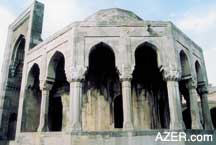  The
Shirvan shahs ruled the khanate of Shirvan in northern Azerbaijan
from the 6th to the 16th centuries. In 1191, after a devastating
earthquake destroyed the capital city of Shamakhi, the residence
of the dynasty was moved to Baku. It was during this period in
the 12th century that Shirvanshah Manuchehr III ordered that
the city be surrounded with citadel walls. The
Shirvan shahs ruled the khanate of Shirvan in northern Azerbaijan
from the 6th to the 16th centuries. In 1191, after a devastating
earthquake destroyed the capital city of Shamakhi, the residence
of the dynasty was moved to Baku. It was during this period in
the 12th century that Shirvanshah Manuchehr III ordered that
the city be surrounded with citadel walls.
The Shirvanshah Palace was built by Khalil and his son Farrokh
Yassar between 1435 and 1442. The complex includes Living Quarters,
the Divankhana (Royal Assembly), Family Tomb, Mosque, Mausoleum
and bathhouse. Currently, it is under reconstruction. Built on
the highest point of "Ichari Shahar" (literally "Inner
City" or what people often refer to as Baku's "Old
City"), it is one of the most striking monuments of medieval
architecture.
Like so many other old buildings in Baku, the real function of
the Shirvanshah complex is sill under investigation. Though commonly
described as a palace, some experts question this analysis as
it does not have the royal grandeur or the huge spaces normally
associated with such residences. There are no grand entrances
for receiving guests nor any huge royal bedrooms. [See "The
Shirvanshah Complex: Splendor of the Middle Ages," in AI
8.2 (Summer 2000), pages 28 ff. Search at AZER.com.]
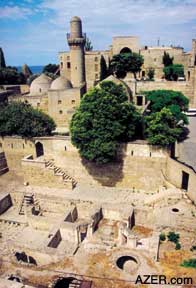 |
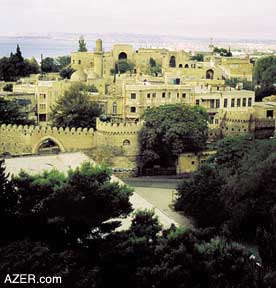 |
Above: (Left)The Shirvanshahs Palace today
which was built in the 15th century. In the novel, Ali was able
to go up on the roof of his 2nd story home and look out over
the Palace. Right: Looking inside the citadel walls of the Inner
City. The gate in the lower left corner is the one that Ali seemed
to use most often. Photos: Blair.
The Shirvanshah palace was almost in Ali's backyard. While growing
up, he often played nearby the ruined complex courtyard. He also
delighted going up on the flat roof of his two-story house and
looking over into the walled Shirvanshahs complex.
In the novel, the author uses the physical presence of the Shirvanshahs
complex to ponder about the significance of the East in a region
that served as a juncture between Eastern and Western civilizations.
Below: Photo from early 20th century from
the bay looking towards the Old City of Baku. Note Shirvanshahs
Palace at the top of the hill. National Photo Archives.
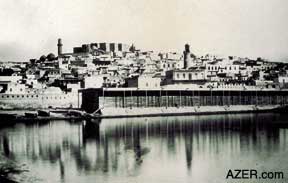  From
"Ali & Nino", page 18. From
"Ali & Nino", page 18.
"On my way home from school, I often strolled through the
ruined palace. The Hall of Justice [Divankhana], with its immense
Moorish colonnades, is empty and desolate. Citizens seeking justice
are supposed to go to the Russian judge outside the wall. But
hardly anybody goes to the Russian judge, and if he does, wise
men despise him, and the children on the street stick out their
tongues at him-not because the Russian judges are bad or unjust.
On the contrary, they are mild and just, but in a manner that
our people dislike. A thief is put in jail. There he sits in
his clean cell, is given tea, even with sugar in it. But nobody
benefits anything from this, least of all the man from whom he
stole.
"People shrug their shoulders and do justice in their own
way. In the afternoon, the plaintiffs come to the mosque where
wise old men sit in a circle and pass sentence according to the
laws of Sharia-the law of Allah: "An eye for an eye, a tooth
for a tooth."
Below:
Boys playing soccer on the
street where Ali allegedly lived. Photo: Blair.
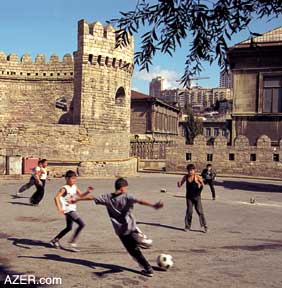  "Sometimes
at night, shrouded figures slip through the alleys. A dagger
strikes like lightning, a little cry, and justice is done. Blood
feuds are running from house to house. Sometimes a sack is carried
through the alleys when the night is darkest. The muffled groaning,
a soft splash in the sea, and the sack disappears. The next day
a man sits on the floor of his room, his robe torn, his eyes
full of tears. He has fulfilled the law of Allah: death to the
adulteress. "Sometimes
at night, shrouded figures slip through the alleys. A dagger
strikes like lightning, a little cry, and justice is done. Blood
feuds are running from house to house. Sometimes a sack is carried
through the alleys when the night is darkest. The muffled groaning,
a soft splash in the sea, and the sack disappears. The next day
a man sits on the floor of his room, his robe torn, his eyes
full of tears. He has fulfilled the law of Allah: death to the
adulteress.
"Our old town is full of secrets and mysteries, hidden nooks
and little alleys. I love these soft night murmurs, the moon
over the flat roofs, and the hot quiet afternoons in the mosque's
courtyard with its atmosphere of silent meditation.
"God let me be born here, as a Muslim of the Shiite Faith
in the religion of Imam Jafar. May He be merciful and let me
die here, in the same street, in the same house where I was born.
Me and Nino, a Christian, who eats with knife and fork, has laughing
eyes, and wears filmy silk stockings."
Back to Ali
and Nino Walking Tour Index
Back to Index AI 12.2 (Summer
2004)
AI Home
| Search | Magazine
Choice
| Topics
| AI Store | Contact us
Other Web sites
created by Azerbaijan International
AZgallery.org | AZERI.org | HAJIBEYOV.com
|





